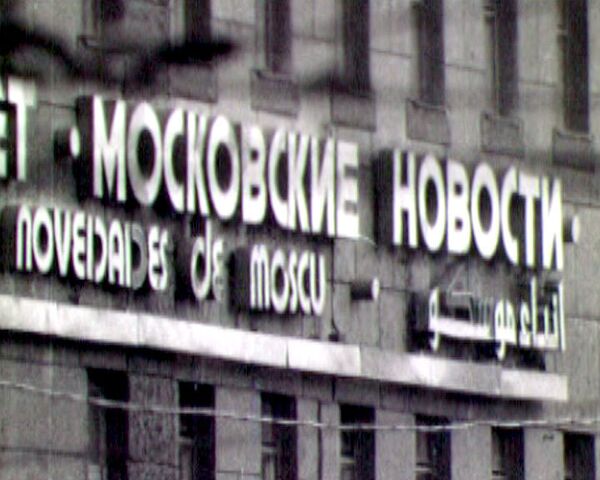The Moskovskiye Novosti celebrates its 30th anniversary this July. Editor-in-chief from 1995 to 2003 Viktor Loshak discusses the newspaper’s early years in an interview with RIA Novosti.
Question: What was The Moskovskiye Novosti like in its early years?
Answer: When Yegor Yakovlev became the editor-in-chief of The Moskovskiye Novosti in 1986, it was a propaganda leaflet describing how wonderful life was in the USSR.
Yakovlev started by building a new team, for the most part his colleagues from Izvestia. I was one of them. He established a set of principles for the new newspaper he was going to publish. One of them – “a newspaper that avoids forbidden subjects” – was almost impossible to imagine. Or take another principle: “a newspaper that serves as a bridge between East and West, between the U.S.S.R. and the West.” And that was how The Moskovskiye Novosti was launched.
Importantly, building on the “bridge” principle, Yakovlev and his team produced several versions of the newspaper that were distributed in the West.
At first the English, Arabic, Spanish and French versions of The Moskovskiye Novosti were published here, in the Soviet Union, in Moscow. But after three or four years, the French version was published in Paris, the German one in Hamburg, and so on. This was not just the newspaper’s success, this was a success of perestroika, which aroused enormous interest abroad. People from around the world saw The Moskovskiye Novosti as unbiased and important.
I became the editor of The Moskovskiye Novosti after Len Karpinsky. The political situation was different at that time – the country was going through a difficult time of change, the Chechen war had just begun – but the newspaper held to its main principles.
It was an independent publication launched by the Novosti Press Agency (the predecessor of RIA Novosti). It was the first publication to become economically self-sufficient. This was back during the Soviet period. In general, The Moskovskiye Novosti readership has not changed very much: it was always educated people, people with democratic views. As far as affluence is concerned, these people belonged to lower middle class. And the newspaper was popular in the country’s big cities.
At the peak of the newspaper’s popularity, Yakovlev described its readership as “people who wake up at six in the morning and go to a news kiosk, because it is impossible to find it anywhere in the country after seven.”
Moreover, at that time several foreign publications were forced to shut down because they were losing money. This was due not so much to the changes in The Moskovskiye Novosti, but to what was happening in Russia and the other post-Soviet countries. The Moskovskiye Novosti has always been a political weekly. But only one newspaper never closed its doors – the English version of The Moskovskiye Novosti.
Q: What were the most memorable events in the history of The Moskovskiye Novosti?
A: Well, when The Moskovskiye Novosti was banned by the State Committee of the State of Emergency (GKChP) in 1991. It was replaced by the Obshchaya Gazeta, and two or three of its issues became history.
We published The Moskovskiye Novosti as a leaflet. We printed it, and then handed it out in underground pedestrian walkways. But the most interesting thing was when we found out that the longhaired, bearded guys who did technical work for us were actually a band. We found some amplifiers at our depot and set them up on Pushkin Square during the State Committee of the State of Emergency’s media crackdown. For about a week we were broadcasting radio news, so to speak. Alexander Kabakov, now a famous writer, was especially good at it.
Q: In your opinion, what contribution did The Moskovskiye Novosti make to Russian journalism?
A: Suffice it to say that many journalists who now head other publications previously worked at The Moskovskiye Novosti, for example, the editors-in-chief of Vremya Novostei and Nezavisimaya Gazeta, several journalists of the newspaper Kommersant. The Moscow New’s standards of journalism were so new and refreshing compared to the Soviet press that our alumni were looked on very highly.

